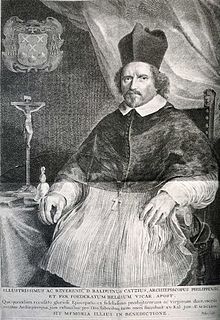
Boudewijn Catz or Cats (ca. 1601 - 18 May 1663) was apostolic vicar to the Dutch Mission from 1662 to 1663.

Boudewijn Catz or Cats (ca. 1601 - 18 May 1663) was apostolic vicar to the Dutch Mission from 1662 to 1663.
Catz was born in Gorinchem. He served as vicar to the Diocese of Haarlem. The Dutch Republic was an officially Protestant country where Catholicism was outlawed and reduced to a minority faith. In the 1630s, a series of portraits of the Haarlem Catholic clergy was commissioned as an act of patronage towards the local artists. The portraits were for the priests' living quarters next to the secret St. Bernardus church in de Hoek on the Bakenessergracht. In 1634 Pieter de Grebber painted Catz. [1]
On the death of Jacobus de la Torre, Vicar Apostolic of the Dutch Mission, Catz was appointed his successor on 31 May 1662. On 9 September 1662, in Cologne he was consecrated titular archbishop of Philippi.
He already seems to have been mentally weak at the time of his appointment as vicar apostolic and died insane in Leuven. During his time as vicar apostolic he was wholly guided by his coadjutor, Van Neercassel, who succeeded him. [2]
The terms Old Catholic Church, Old Catholics, Old-Catholic churches or Old Catholic movement designate "any of the groups of Western Christians who believe themselves to maintain in complete loyalty the doctrine and traditions of the undivided church but who separated from the see of Rome after the First Vatican council of 1869–70".

Francis-Xavier de Montmorency-Laval, commonly referred to as François de Laval, was a French prelate of the Catholic Church. Consecrated a bishop in 1658, he led the Apostolic Vicariate of New France from 1658 to 1674 and then became the first bishop of the Diocese of Quebec from its erection in 1674 until he retired because of poor health in 1688. He continued to work in New France until his death in 1708. Among his accomplishments was the founding of the Séminaire de Québec in 1663. Laval was a member of the Montmorency family, but renounced his rights as heir so he could pursue his ecclesiastical career.

The Catholic Church in Thailand is part of the worldwide Catholic Church, under the spiritual leadership of the Pope in Rome.
The Holland Mission or Dutch Mission was the common name of a Catholic Church missionary district in the Low Countries during and after the Protestant Reformation.

The Roman Catholic Diocese of Haarlem–Amsterdam is a Latin diocese of the Catholic Church in the Netherlands. As one of the seven suffragans in the ecclesiastical province of the Metropolitan Archbishop of Utrecht, the diocesan territory comprises the north west of the Netherlands, including the cities of Haarlem and Amsterdam.
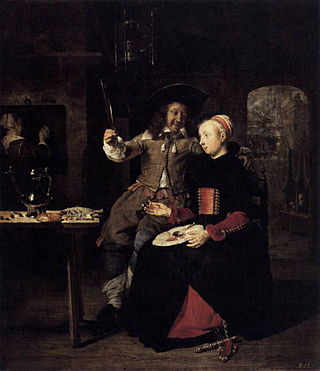
Gabriël Metsu (1629–1667) was a Dutch painter of history paintings, still lifes, portraits, and genre works. He was "a highly eclectic artist, who did not adhere to a consistent style, technique, or one type of subject for long periods". Only 14 of his 133 works are dated.

The Society of Foreign Missions of Paris is a Catholic missionary organization. It is not a religious institute, but an organization of secular priests and lay persons dedicated to missionary work in foreign lands.
Johannes Cornelisz. Verspronck was a Dutch Golden Age portrait painter from Haarlem.

The Archdiocese of Verapoly (Verapolitana) is a Latin Church ecclesiastical territory or archdiocese of the Catholic Church, composed of Latin Catholics of Malabar and headquartered at the city of Cochin, in the south Indian state of Kerala. The archdiocese has administrative control over the suffragan dioceses of Calicut, Cochin, Kannur, Kottapuram, Sultanpet and Vijayapuram. The headquarters is located in Kochi along the Malabar Coast in India. It was originally formed as the Vicariate Apostolic of Malabar in 1657 and became a metropolitan see in 1886. Verapoly is the anglicised name of Varapuzha.
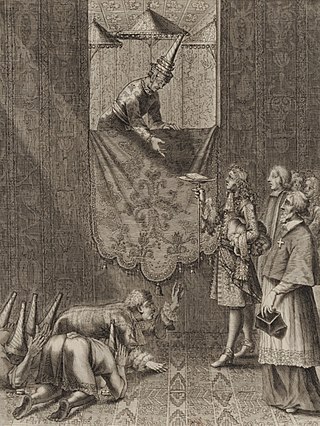
Louis Laneau was a French bishop of the 17th century who was active as a missionary in the kingdom of Siam. He was a member of the Paris Foreign Missions Society. He was initially nominated as the replacement of Msgr Ignace Cotolendi in charge of Nankin.

Pieter Codde also known as Petrus Codde was apostolic vicar of the Catholic Church's Vicariate Apostolic of Batavia, also known as the Dutch Mission, from 1688 to 1702. He served as the Old Catholic Archbishop of Utrecht from 1688 to 1710.

François Pallu, MEP (1626–1684) was a French bishop. He was a founding member of the Paris Foreign Missions Society and became a missionary in Asia.
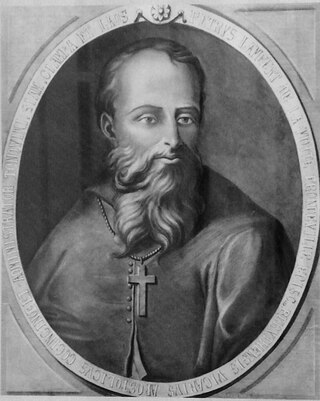
Pierre Lambert de la Motte, MEP was a French bishop. He was a founding member of the Paris Foreign Missions Society and became a missionary in Asia.

Ignace Cotolendi, MEP was a French bishop. He was a founding member of the Paris Foreign Missions Society and became a missionary in Asia.

Johannes Baptista van Neercassel served as Archbishop of Utrecht from 1661 to 1686.
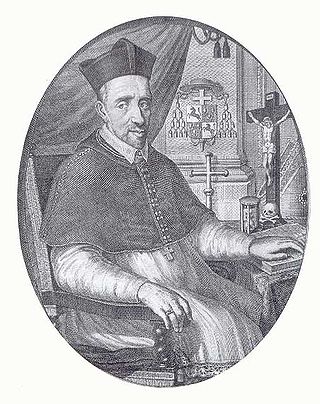
Sasbout Vosmeer was the first apostolic vicar to the Dutch Mission and succeeded Frederick Schenck as the second Archbishop of Utrecht (1602–1614).
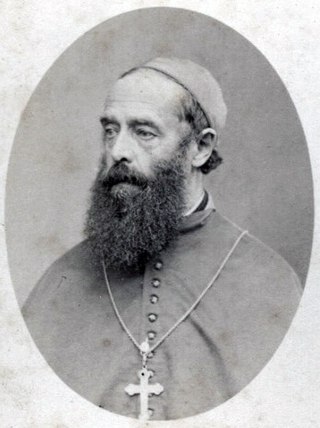
Walter Hermanus Jacobus Steins SJ was a Dutch Jesuit and Catholic prelate, who became Vicar Apostolic of Bombay (1860–1867) and West Bengal (1867–1877) in India, archbishop ad personam, and third Bishop of Auckland (1879–1881).

The Lordship of Utrecht was formed in 1528 when Charles V of Habsburg conquered the Bishopric of Utrecht, during the Guelders Wars.

The Bishops' Conference of the Netherlands is a permanent body within the Roman Catholic Church in the Netherlands which determines policies and directs the apostolic mission within the Netherlands. It is governed by bishops from around the country.
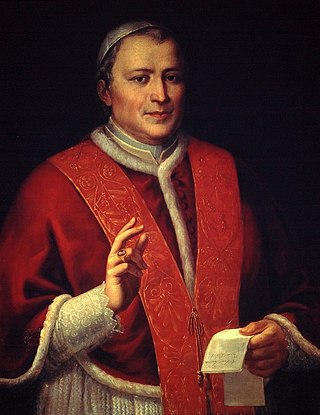
On 4 March 1853, Pope Pius IX restored the episcopal hierarchy in the Netherlands with the papal bull Ex qua die arcano, after the Dutch Constitutional Reform of 1848 had made this possible. The re-establishment of the episcopal hierarchy led to the April movement protest in 1853.